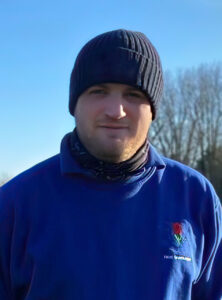A day in the life: Kevin Goude
Related Articles
The head greenkeeper at Spalding Golf Club in Lincolnshire, an 18-hole parkland course that extends to more than 6,000 yards from the back tees, takes us through his average day.
What time do you arrive at the club and what is your morning routine?
I arrive at 5:30am and check the very important weather forecast. This enables me to begin planning the day’s tasks – factoring in the conditions, any constraints, available team members and resources and so on. In the event that we’ve had a lot of rainfall overnight, I don my head torch and conduct a course inspection to decide on the status of the course.
My team arrive from 6:00am to prepare for the team briefing at 6:15am. After the briefing we make our way out onto the course to complete the morning tasks before a scheduled break at 10:00am. Work then continues for the remainder of the day.
How many people are there in your team and do you share tasks?
We currently have a team of six, all of whom share the daily tasks. The rotation of tasks ensures everyone has variety in their roles, promotes personal development and, should a member of the team be on holiday or sick leave, everyone can comfortably step into each other’s shoes to complete the tasks needed to a high standard.
How do you motivate your colleagues?
Providing achievable goals is extremely important as it provides direction, focus and motivation. When personal and team goals are met you can feel the positivity radiate outwards. Equally, offering a safe space for team members to share any concerns is just as important – senior staff who are approachable often have the most productive conversations with their staff.
What aspects of your job give you the greatest satisfaction?
When everything comes together before a big tournament. There’s no better feeling than seeing all plans have been actioned, the course is playing beautifully and everyone is proud to call Spalding Golf Club their home course.
And the least satisfaction?
Poor etiquette on the course, mostly seen in the form of unrepaired pitch marks.
Whilst we try not to dwell on the negatives and allow the minority to spoil it for the majority, we continually look for solutions such as organising divotting parties and providing players with the necessary tools and education to encourage them to take more care.
Have you attended any courses recently, and if so, what did you take away?
As a whole team we recently undertook emergency first aid training. Knowing that myself and the team could respond effectively to a range of specific injuries and illnesses, when we are in contact with the public daily, gives a greater sense of confidence that we are fulfilling our duty of care adequately.
What’s your favourite season of the year and why?
Personally, I love the winter months as this is when the majority of new projects and improvements to the course are undertaken. It can also offer you time for reflection on the previous year and what improvements you can make for the upcoming season.
Are you witnessing evidence of climate change and, if so, how has your job had to adapt to changing weather patterns?
British winters have certainly become milder and wetter in recent years. As part of our five-year plan, we recently installed new drainage on the 12th fairway, which I’m pleased to report is performing very well. Further drainage work is planned for 2024 which will help us to futureproof the club and keep the course open as much as possible in this increasingly wet climate.
Have you had to overcome any course issues with disease and / or pests?
Chafer grubs were rife last year! We combated this issue in a number of ways, from trapping the bugs at an early stage, placing bird scarers to deter predators and applying Acelepryn to the worst affected areas – mainly tees.
We will continue to monitor this issue going forwards and adapt our methods as necessary.
What piece of equipment would you say is the most popular and frequently used by you and your team?
We recently purchased a GKB Deep Tine Aerator (DTA) 160, and since its introduction to the fleet we have used it extensively across the course – helping our ongoing drainage work across our greens, tees, approaches and fairways.
With a growing focus on sustainability, do you deploy any sustainable practices in the management of your course?
We’ve recently installed more drainage on the course, which we have linked to our nature pond.
This enables the excess rainwater to be recycled into our irrigation reservoir. In addition to linking drainage to our reservoir, we are also looking into a recycling wash pad.
What do you do to support wildlife?
We ensure there are undisturbed areas of wild foliage and log piles around the course to provide a refuge for wildlife to thrive. The nature pond also serves as a freshwater ecosystem, and owl boxes are nestled safely within the trees.
We are also mindful of the products and machinery we use. Is there a more eco-friendly method to our daily tasks? This is a question the team and I regularly challenge ourselves with.
What are the technological developments that you feel have been the most important in your career to date?
Improvements in machinery. When I began my career in greenkeeping 21 years ago, things were very different. The introduction of hybrid technology has had a positive impact on the environment, reducing emissions, noise and hydraulic leaks.
Do you use social media professionally and what do you think this contributes to the industry?
I use social media personally to connect with others within the industry. I believe it is a great tool for accessing information and education, and it can be a good platform for sharing new and innovative ideas.
How would you improve the greenkeeping industry?
I would like to see the younger generation, particularly those from less affluent backgrounds, being exposed to the industry and all it has to offer. Engaging with schools and youth groups to inject new life into our golfing communities brings with it so many challenges but also so many opportunities.
An engaging sport is one that will thrive, not just survive.
What advice would you give to a young greenkeeper starting out today?
Take every opportunity to be hands on and absorb as much information as you possibly can. Qualifications offer you many learning opportunities and the chance to demonstrate your skills and knowledge. Don’t be afraid to push yourself.
How do you spend your leisure time?
Family time is very important and a priority with two young children. I have always loved playing golf and ensure I make time for this also.


























